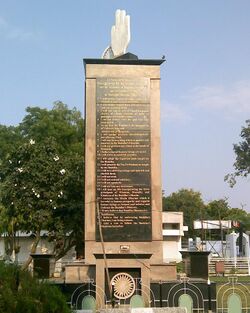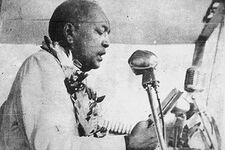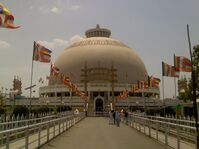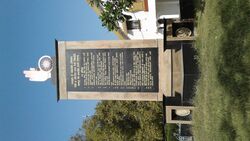Religion:Twenty-two vows of Ambedkar
The Twenty-two vows or twenty-two pledges are the 22 Buddhist vows administered by B. R. Ambedkar, the revivalist of Buddhism in India, to his followers. On converting to Buddhism, Ambedkar made 22 vows, and asked his 400,000 supporters to do the same.[1] After receiving lay ordination, Ambedkar gave dhamma diksha to his followers. This ceremony organised on 14 October 1956 in Nagpur included 22 vows administered to all new converts after Three Jewels and Five Precepts. On 16 October 1956, Ambedkar performed another mass religious conversion ceremony at Chandrapur.[2]
It is believed by Ambedkarite Buddhists that these vows are the guidelines of the social revolution that motivates human instincts. These vows demonstrate both the social movement aspect of Navayana Buddhism, and demonstrate its core deviation from earlier sects of Buddhism. In India, these vows are taken as an oath by individuals or groups of people when they convert to Buddhism.[3][4]
Vows
The following are the 22 vows administered by Ambedkar to his followers:[1]
- I shall have no faith in Brahma, Vishnu and Maheshwara, nor shall I worship them.
- I shall have no faith in Rama and Krishna, who are believed to be incarnation of God, nor shall I worship them.
- I shall have no faith in Gauri, Ganapati and other gods and goddesses of Hindus, nor shall I worship them.
- I do not believe in the incarnation of God.
- I do not and shall not believe that Lord Buddha was the incarnation of Vishnu. I believe this to be sheer madness and false propaganda.
- I shall not perform Shraddha nor shall I give pind.
- I shall not act in a manner violating the principles and teachings of the Buddha.
- I shall not allow any ceremonies to be performed by Brahmins.
- I shall believe in the equality of man.
- I shall endeavour to establish equality.
- I shall follow the Noble Eightfold Path of the Buddha.
- I shall follow the ten paramitas prescribed by the Buddha.
- I shall have compassion and loving-kindness for all living beings and protect them.
- I shall not steal.
- I shall not tell lies.
- I shall not commit carnal sins.
- I shall not take intoxicants like liquor, drugs, etc.
- (The previous five proscriptive vows [#13–17] are from the Five Precepts.)
- I shall endeavour to follow the Noble Eightfold Path and practice compassion and loving-kindness in everyday life.
- I renounce Hinduism, which disfavors humanity and impedes the advancement and development of humanity because it is based on inequality, and adopt Buddhism as my religion.
- I firmly believe the Dhamma of the Buddha is the only true religion.
- I consider that I have taken a new birth. (Alternately, "I believe that by adopting Buddhism I am having a re-birth."[6])
- I solemnly declare and affirm that I shall hereafter lead my life according to the teachings of Buddha's Dhamma.
The vows marble stone
Considering the historical significance of these twenty-two vows, the then president of "Dr. Babasaheb Ambedkar Deekshabhoomi Memorial Committee", and former Governor of Bihar and Kerala R. S. Gavai and Sadanand Fulzele, the secretary of the organization, have carved these 22 vows on a wide marble stone at the Deekshabhoomi ground and placed the pillar at the first sight of the stupa. At a Buddha Vihara at Wardha, under M. L. Kasare's leadership, a similar grand pillar has been erected.[7][8]
References
- ↑ 1.0 1.1 Omvedt 2003, pp. 261–262.
- ↑ Jenkins, Laura Dudley (2019-04-11). "Ambedkarite Buddhists: Religious and Political Mobility" (in en). Religious Freedom and Mass Conversion in India. University of Pennsylvania Press. pp. 65–66. ISBN 978-0-8122-9600-6. https://books.google.com/books?id=pOuRDwAAQBAJ&dq=%22The+Mass+Conversion+to+Buddhism%22&pg=PA66.
- ↑ "236 dalits adopt Buddhism in protest against Hathras Case" (in en). 2020-10-16. https://mediaindia.eu/society/dalit-conversions-in-india/.
- ↑ Purandare, Vaibhav. "How Babasaheb rejected and criticised the Vedas". The Economic Times. https://economictimes.indiatimes.com/news/politics-and-nation/how-babasaheb-rejected-and-criticised-the-vedas/articleshow/56750772.cms.
- ↑ Bhagwat, Ramu (19 December 2001). "Ambedkar memorial set up at Deekshabhoomi". The Times of India. http://articles.timesofindia.indiatimes.com/2001-12-19/mumbai/27228796_1_dr-ambedkar-narayanan-smarak-samiti.
- ↑ "22 Vows". http://www.jaibheem.com/22%20Vows.htm.
- ↑ "'बावीस प्रतिज्ञा म्हणजे सत्यदर्शन'" (in mr). https://maharashtratimes.com/maharashtra/aurangabad/articleshow/51675017.cms.
- ↑ "क्या भाजपा ने आंबेडकर की 22 प्रतिज्ञाएं पढ़ी हैं?" (in hi). BBC News हिंदी. https://www.bbc.com/hindi/india-43604208.
Bibliography
- Omvedt, Gail (2003). Buddhism in India: Challenging Brahmanism and caste. Thousand Oaks, CA: Sage Publications. ISBN 0761996648. https://archive.org/details/buddhismindiacha00omve.
- "Ambedkar's 22 vows: Why Babasaheb made the pledge at the centre of BJP-AAP row" (in en). The Indian Express. 8 October 2022. https://indianexpress.com/article/explained/explained-politics/ambedkars-22-vows-why-centre-of-bjp-aap-row-8197971/.
 |





